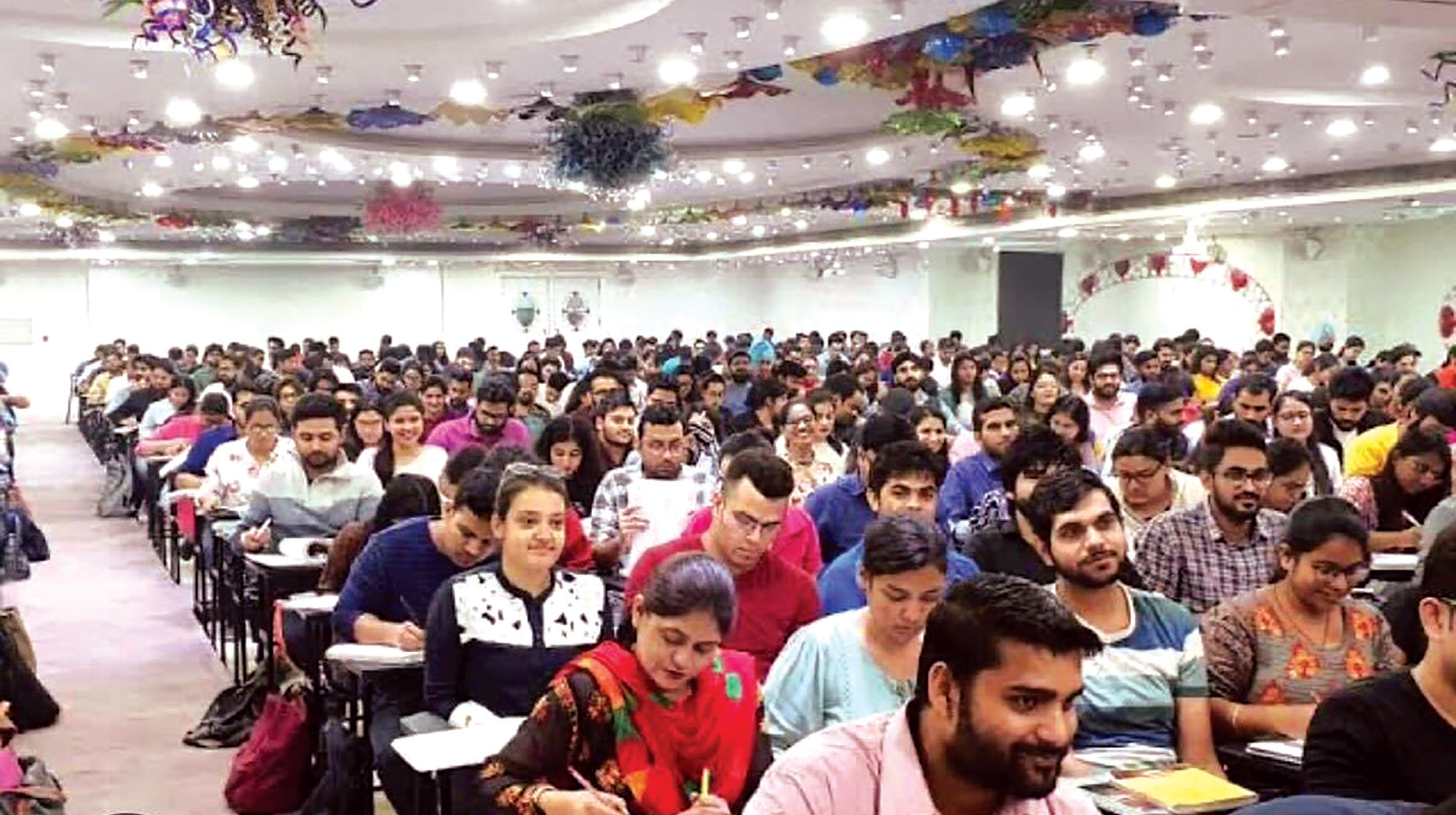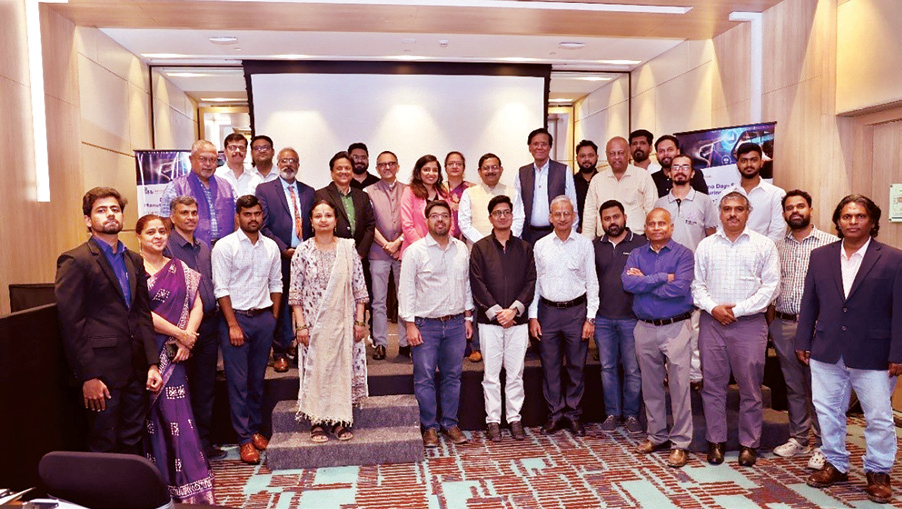
A gold rush for judicial services
With law schools churning out more graduates than ever, the competition to become a judge in India’s lower courts and tribunals has heated up. The coaching industry is cashing in.
Nootan Sharma
When Sonali Sharma was preparing for the judicial services exam in 2016 after completing her law degree from Aligarh Muslim University, there were only 400 students in her batch. Today, that number has more than doubled. During this period, her life has changed as well. Sharma, now 31 years old, is still surrounded by law books. But her role has shifted from an aspirant to an instructor, teaching the 800-odd students who want to become India’s next generation of judicial officers. The competition to become a judge in India’s lower courts and tribunals has been heating up over the past few years, reflecting the larger shift in the career choices of graduates. And coaching institutes like Physics Wallah, Study IQ, Drishti IAS, and Unacademy are cashing in. The desire for a government job isn’t limited to UPSC, Railways, SSC, or teaching. With law schools admitting more students than ever from 1.88 lakh in 2012-13 to 4.32 lakh in 2019-20 many are turning to judicial exams. They are drawn by the job’s social prestige, attractive government perks, and the stability it offers compared to the long hours and high competition in corporate law. The judiciary has now become the next gold rush for India’s ubiquitous coaching industry.
Law was once a profession largely reserved for those with family connections in litigation or corporate law – much like the entitled political dynasty and nepo kids of Bollywood. Judges are still largely viewed as familyrun operations, upper caste cabals the argument often made against the collegium system. Now, law graduates have struck a proverbial gavel on this mindset. Online court proceedings moved the needle. “Social media has also played an important role in making the online courtroom available. People started realising that not only IAS and IPS but judges also have powers and they also have social value,” said a civil judge in Haryana who cleared the judicial service exam in 2022.
New business for coaching institutes: India’s bustling coaching industry, which once thrived primarily around UPSC and other government exams, has found an untapped goldmine in judicial services. The increase in the number of law graduates has led to a corresponding surge in demand for coaching services. “In UPSC, the growth has become stagnant, but the judiciary’s growth has been very fast,” said a teacher from an online coaching institute.
Take Physics Wallah, for example. The online ed-tech giant, known for its success in coaching for competitive exams like JEE and NEET, launched its Judiciary Wallah vertical in 2023. Its first paid foundation course attracted 350 students. By October 2023, the company launched a crash course, drawing 1,800 students in a matter of weeks. “We currently have 5,000 paid students and an additional 36,000 students accessing our free content on YouTube,” said Atul Kumar, CEO of Physics Wallah’s online vertical. StudyIQ and Unacademy have followed suit, expanding their course offerings to include judicial services exams. The financial rewards have been immense. “When we were selling our recorded courses, the revenue was around Rs. 5 lakh per month. With 5,000 paid students, it increased to Rs. 1 crore a month,” said a former teacher from StudyIQ.
Just like other courses, online coaching for judicial services offers the same benefits to aspirants from smaller towns and cities it’s both flexible and affordable. The fees for online courses range between Rs. 17,000 and Rs. 50,000, a fraction of what offline coaching institutes like Rahul IAS charge Rs. 3.2 lakh for one course. The judiciary has now become the next gold rush for India’s ubiquitous coaching industry | Photo by special arrangement
More law graduates and more aspirants: There is, of course, the great paradox about vacancies while the number of aspirants has gone up, the number of vaccines for judicial officers in many states has gone down. In Uttar Pradesh, around 60,000 aspirants competed for 610 seats in 2019. Last year, more than 79,000 applicants took the judicial services exam for 303 vacancies. In Bihar, between 2020 and 2023, the number of applicants increased from 15,000 to 17,000. But the number of vacancies went the opposite way from 221 to 155. This trend is not isolated Delhi, traditionally one of the most sought-after destinations for judicial service aspirants, saw the number of applicants grow from 10,000 for 50 vacancies in 2019 to 15,000 for 123 posts in 2023.
Law becoming one of the go-to career options for Indian youth is reflected in numbers as well. Many private colleges and universities have come up in the country in the past few years, contributing to more law graduates entering the workforce. According to the education ministry’s AISHE report, between 2012-13 and 2019-20, the number of students enrolled in law courses grew by approximately 130%—from 1.88 lakh to 4.32 lakh. For many of these aspirants, the judicial services exams have become an attractive alternative to the long hours and high pressure of corporate law. Sahil Kumar, a 28-yearold who graduated from Delhi Law University in 2019, chose judicial services over litigation or becoming a corporate lawyer as these options “require years to establish” oneself. “I am the first in my family to complete law. Judiciary was my best option,” said Kumar, who cleared the Haryana Judicial Services in 2022 after failing to clear the interview round of the Delhi Judicial Services. Kumar did not take any coaching classes, although his friends have all opted for one.
For Preeti Jangra, another aspirant, judicial services became the ultimate choice. “It is the safest option for me. After becoming a judge, there will be no fear of losing my job. I am a first-generation lawyer, so it has been really hard for me to find a good job, that too without having served time in law firms. A government job offers job security, money, and social reputation, and being a woman, there will be perks like maternity and child care leaves,” said Jangra, who will appear for the Haryana Judicial Services examination next year.
 English daily published in Bengaluru & Doha
English daily published in Bengaluru & Doha






